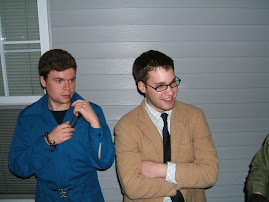The book works as a good supplement for the film. The first two parts give good background. First about the book and then about making the film. They provide information that would not have been understood immediately from both. They provide good and interesting information, but I think the chapter on the film can never make up for viewing the film. The chapter concerning organic yogurt does good job of providing the story and information. It seems a little emotionally detached, but I do not feel that really hinders the chapter. The chapter tells the success story of the organic yogurt business, but also provides a warning of big business as it creeps into the organic realm by purchasing established businesses. Profit is their goal, not healthy food. The film and book work well together with emotion and facts.
Monday, February 15, 2010
Film to Book Comparison
The strongest method in the film for getting the point across was the interviews with real people. These interviews with real people showed up the way we are producing food is affected good, average people in negative ways. These first hand accounts were touching and convincing. The interviews with the farmer who still feeds his animals grass and keeps them outside stood out to me the most. This farmer could increase his production and wealth by feeding animals corn and keeping them inside, but he won't do it because of his ethics and morals. He wants to raise healthy animals, so that humans can consume them and stay healthy as well. The farmer also discussed how the food industry wanted to shut him down because he slaughters the animals outside. He countered this by discussing how chemicals are not used on the meat he produces. In the end, this man seemed like the most intelligent farmer I have ever seen. Another farmer in the film who used the meat industry's way of raising and who was wealthier did not seem nearly as intelligent. The farmer still using grass could explain everything behind the meat better, just used bigger words, and did not compromise his values when compared to the farmer using the meat industry's methods. This comparison really stood out to me even if it was not pointed out in the film. It make me think about a whole area of intelligence just focusing on the being able to use your beliefs along with sympathy/empathy to turn away from greed and blind money.
Subscribe to:
Post Comments (Atom)

I agree with you (and most of the class, by the looks of it) that the independent farmer scene was the most influential scene in the movie. Is it because a farm is so unfamiliar to us, or because it is our idea of what a farm should be? I'm not sure, but the farmer was very optimistic and I was drawn to his ideas; he didn't seem like any kind of genius to me. Perhaps wisdom is a better term to describe his mental capacity.
ReplyDeleteThis comment has been removed by the author.
ReplyDeleteThe film does show a good contrast to those who are outside the agro-industrial complex and those that are inside. Those inside are typically "in-the-box" businessmen who are obsessed with the new little gadgets that they can attach to whatever process they want. They fail to take into consideration the ultimate end of what they're doing, only the means for which to keep doing efficiently. Why the fuck do we, as a species that has subsisted primarily off grains and legumes for the past 10,000 years, need to be injected with high-octane chemically-modified protein every couple of hours? Two hundred years ago beef was a delicacy, only the most affluent had it and even then it wasn't as "good" as it is now.
ReplyDeletePeople on the outside like Pollan, Schlosser and the farmers interviewed are taking these questions to heart and opening up a dialogue about the ends methods of what we eat and not merely the means.